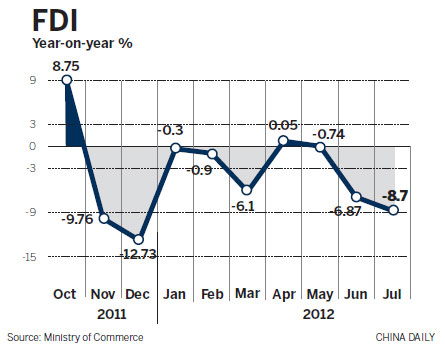
Foreign direct investment into China hit a two-year low in July, reflecting, in part, global investor concern over slowing growth.
Ministry of Commerce officials insisted that the decline was temporary, while economists proposed long-term measures to address the drop.
FDI fell by 8.7 percent from a year earlier to $7.58 billion in July, the smallest inflow since July 2010 and the eighth drop in nine months, the Ministry of Commerce said on Thursday. May saw a slight rise.
Ministry spokesman Shen Danyang blamed both international and domestic factors for the setback. Domestic factors included tight land supply, rising labor costs and lackluster consumer spending, he said.
But Shen insisted that the decline is temporary due to the long-term attractiveness of investment opportunities.
 |
Economists pointed to a weak performance on the macroeconomic level as a contributing factor to the fall. Zhang Xiaoji, director-general of the foreign economic relations department at the Development Research Center of the State Council, interpreted the decline as a response to lower growth.
Zhang proposed that the government should allow investors greater access to the service industries and open up some of the remaining sectors in manufacturing. GDP expanded by 7.6 percent in the second quarter this year from a year earlier, down from 8.1 percent in the first quarter, and was the lowest since the second quarter of 2009.
Premier Wen Jiabao admitted on Tuesday that the "downward pressure" on the economy was "relatively large" and would remain so for some time. Growth in industrial output fell to 9.2 percent year-on-year in July, down from 9.5 percent in June and was the lowest since May 2009, according to the National Bureau of Statistics.
Electricity generation edged up only 2.1 percent year-on-year, indicating a sharper slowdown in heavy industry.
Another complication, besides the growth slowdown, is the recent yuan depreciation, said Wang Jun, senior economist at the China Center for International Economic Exchanges. Wang forecast GDP growth in the third quarter to be even worse than the second quarter, and that could be lower than 7.5 percent year-on-year.
Some economists said they believed the United State's manufacturing revival could be a new factor contributing to China's FDI decline as well as eurozone financial woes.
Under these circumstances US companies will inevitably reconsider their China investment strategy, noted Lu Zhengwei, chief economist with the domestic Industrial Bank.
Investment from the EU was $3.97 billion in the first seven months, down by 2.7 percent year-on-year. German companies were Europe's champions in China investment, having committed $960 million in the same period, a surge of 27.12 percent from a year earlier.
Also in the first seven months, investment from Japan rose by 19.1 percent year-on-year to $4.73 billion.
Economist Zhang Xiaoji said it is important for China to develop and demonstrate long-term advantages in attracting FDI as rising wages are weakening its traditional advantage.
ODI surges
In the meantime, China's outbound investment surged 52.8 percent year-on-year to $42.22 billion in the first seven months, centering on service industries rather than targeting resources and energy products, Shen, the Ministry of Commerce spokesman, said.
From January to July, investment increased by 67.7 percent year-on-year in Latin America, 63.1 percent in Asia, and 56.5 percent in North America.
North American and European companies are favorites for Chinese buyers for their head-start technology and energy resources.
Contact the writers at lijiabao@chinadaily.com.cn and dingqingfen@chinadaily.com.cn


 Washington to remain focused on Asia-Pacific
Washington to remain focused on Asia-Pacific RQFII target blue chips amid bear market
RQFII target blue chips amid bear market Australian recall for top two exporters
Australian recall for top two exporters China fears new car restrictions
China fears new car restrictions